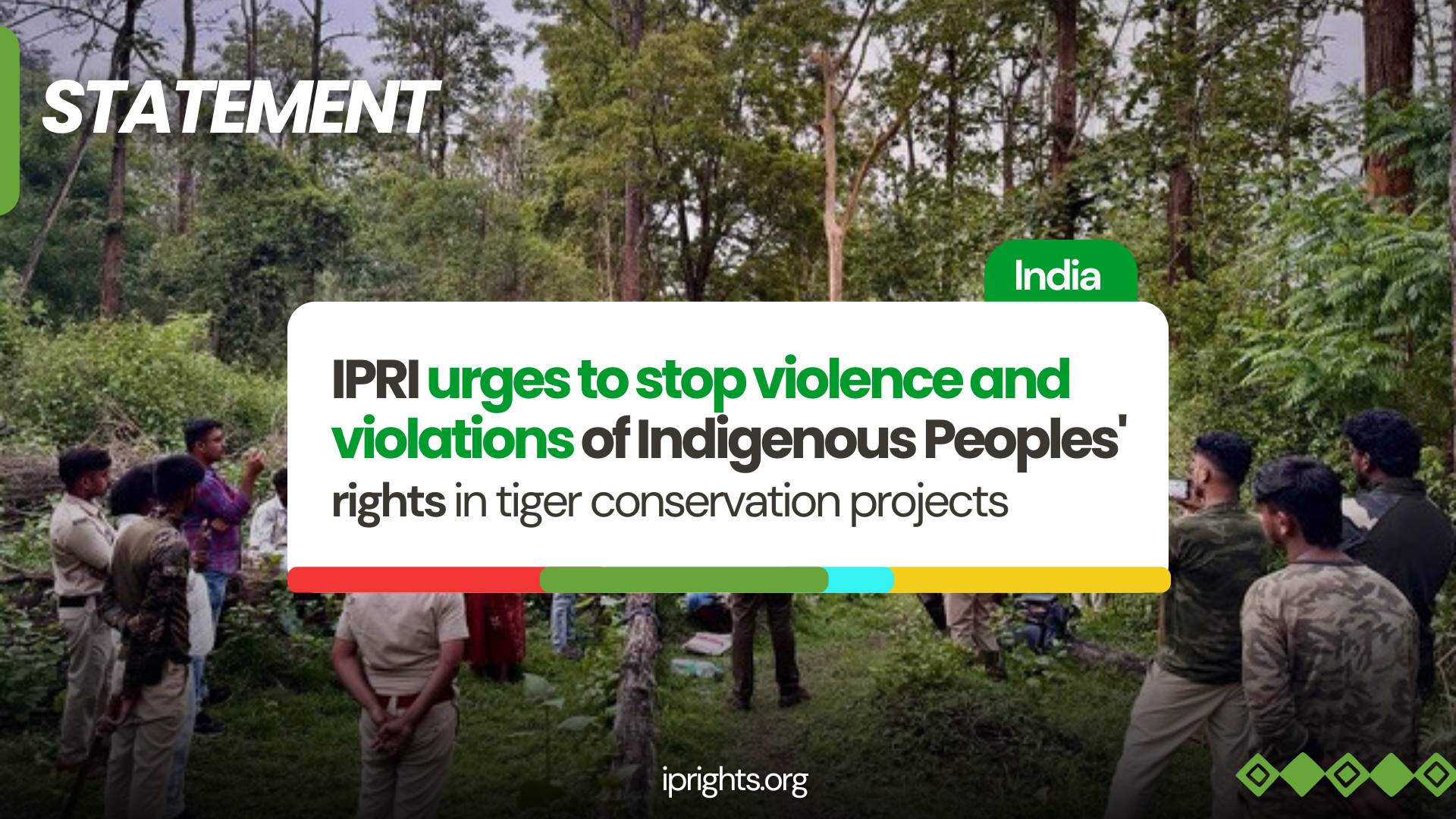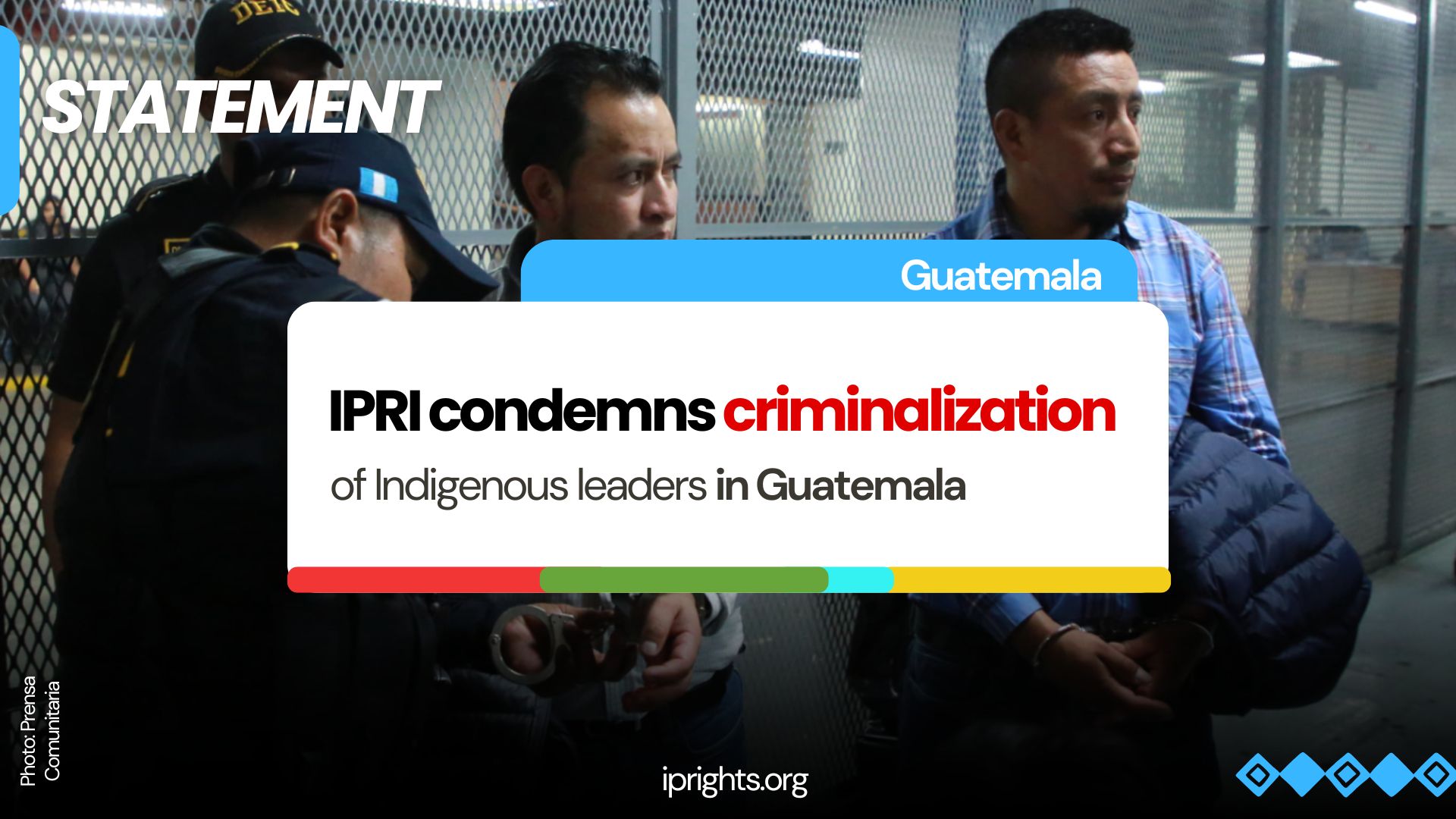Article on the occasion of International Day of the World's Indigenous Peoples
By Joan Carling, Executive Director of IPRI
Last year proved to be a pivotal period for Indigenous Peoples, marked by challenges and advancements in our ongoing struggle for rights recognition and environmental protection. Amidst our struggles for our survival, Indigenous Peoples continue to confront the unjust criminalization, the destruction of our lands and resources, and the silencing of our voices.
The Continuing Criminalization of Indigenous Peoples
Despite the adoption of the landmark UN Declaration on the Rights of Indigenous Peoples in 2007 by UN member states, the distressing cycle of criminalization persists, fueled by discriminatory laws and policies that disproportionately target Indigenous Peoples. These laws primarily pertain to land rights, national parks, conservation measures, natural resource management and extraction, environmental protection, traditional occupations, and constraints on cultural practices and beliefs. Moreover, peaceful protests to resist destructive projects and extractive industries have been met with unwarranted repression, violence, and legal persecution. This has led to the arrest, detention, and even extrajudicial killings of Indigenous leaders and activists who strive to uphold our rights and the environment.
Startling data from Global Witness and Indigenous Peoples Rights International (IPRI) reveal that Indigenous land and environment defenders constituted the majority (60%) of those killed in the last three years, despite comprising only 6% of the global population. IPRI has also documented at least 389 instances of grave human rights violations in 2021-22, including killings, arrests, legal harassment, evictions, and more. An alarming uptick in requests for urgent assistance from Indigenous leaders and communities facing threats and risks as human rights and environmental defenders in Latin America, Asia, and Africa underscores their alarming condition. These sustained acts of criminalization and aggression toward Indigenous peoples lay bare the lack of commitment by states to uphold the UNDRIP, perpetuating colonial legal frameworks and discriminatory and unjust regulations that undermine our dignity and well-being as Indigenous peoples
The Intersection of Social Justice and Environmental Stewardship
The protection of Indigenous Peoples’ rights, social justice, and environmental conservation are intricately interwoven. Indigenous Peoples share a deep relation with nature, valuing our lands not as commodities but as entities intertwined with our identities, cultures, and sustainable livelihoods and ways of life. However, our collective right to our lands, territories, and resources is not fully recognized and protected by most states, giving rise to environmental degradation, criminalization, and human rights abuses without accountability. Meanwhile, business activities that involve large-scale exploitation of our lands and resources, which we have protected for generations, enjoy legal protection and are even incentivized by states as powerful economic players. The disparity is evident when an Indigenous farmer is incarcerated for using trees he planted to build his home, while a logging conglomerate receives legal license for extensive commercial logging in Indigenous territories. Thus, the imperative to reform policies to counteract the criminalization of Indigenous Peoples and advance social justice remains pivotal in safeguarding our rights and fostering a more sustainable world.
"The imperative to reform policies to counteract the criminalization of Indigenous Peoples and advance social justice remains pivotal in safeguarding our rights and fostering a more sustainable world".
Climate Change and Threat to the Environment
Indigenous peoples shoulder a disproportionate burden of climate change due to our continued habitation of and guardianship over vulnerable ecosystems. Escalating sea levels, severe climatic events such as prolonged droughts and devastating floods, and the loss of biodiversity all pose existential threats to lifestyles and food security. Paradoxically, while our carbon footprint remains minimal, we are denied adequate resources and technical support, leaving us to fend for ourselves with the repercussions of climate change. Although support for loss and damage now forms part of global climate action, prioritizing direct support and assistance to Indigenous peoples in enhancing our resilience and restoring our degraded lands, territories, resources, and sustainable livelihoods is imperative. This initiative would also make substantial contributions to climate mitigation and adaptation, benefiting society at large.
Additionally, climate actions aimed at renewable energy development, including the extraction of transition minerals without the informed consent of Indigenous peoples, precipitate grievous breaches of our collective rights and well-being. These unjust actions amount to a form of green colonization that exacerbates social injustice against Indigenous Peoples. For decades, we have hosted energy projects in our domains such as large dams and geothermal plants, yet our communities lack access to electricity and non-delivery of promised benefits such as employment and social services. These impositions have led to evictions, the destruction of livelihoods, and escalation in violence against women, among other injustices. Regrettably, solar and wind farms, as well as the mining of transition minerals such as lithium, nickel, and cobalt, are now being thrust upon us in the name of climate action.
Worse still, when we defend our lands and rights, we are cast as criminals and adversaries of climate action and development. An increasing number of states are even amending regulations to facilitate the implementation of renewable energy projects, especially the mining of transition minerals, by curtailing public consultations, banning protest actions, and expediting project approval without thorough assessments of environmental and social impacts, including human rights due diligence. These undemocratic actions will surely spark more conflicts, violence, and criminalization of Indigenous peoples, given that an estimated 60% of transition minerals are situated within Indigenous territories.
While Indigenous Peoples support the shift away from fossil fuels, a holistic and sustainable approach is requisite to address the drivers of climate change. Urgent collective actions rooted in global solidarity and the accountability of those responsible for climate change are urgent over unending global negotiations. Maintaining the status quo with the business-as-usual approach in the transition to green energy will only exacerbate the unsustainable consumption of the planet's resources while amplifying inequalities.
Moreover, acknowledging and tackling our vulnerability to climate change, ensuring our meaningful involvement in shaping climate actions, safeguarding our rights, and supporting our pivotal role as stewards of nature are indispensable to advancing climate justice and sustainability within the global climate action agenda.
Indigenous Wisdom: A Cornerstone of Climate Action
Indigenous Peoples possess a wealth of traditional knowledge derived from centuries of coexisting harmoniously with nature. This wisdom encompasses sustainable land use, conservation practices, and climate adaptation strategies that bolster community resilience, alongside mitigation measures like soil regeneration, reforestation, and peatland restoration that enhance carbon sequestration. By integrating Indigenous knowledge and innovations into climate action as part of the protection of our rights, the world stands to gain resilient and ingenious approaches to environmental challenges.
Empowering Indigenous Voices and Fostering Solidarity and Partnerships
To drive meaningful change, it is essential to reverse the criminalization of indigenous peoples through policy coherence in upholding indigenous peoples' rights at national, regional, and global levels, empower Indigenous voices, and ensure our meaningful participation in climate change and sustainable development processes at the national, regional, and international levels. By respecting and protecting our knowledge, agency, and expertise, the world can forge a more equitable and sustainable path toward climate resilience. This also requires building solidarity and partnerships with indigenous peoples as an indispensable actor with dignity and rights.





